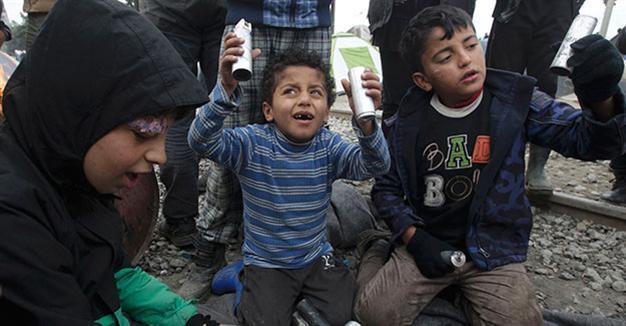Greece blasts Macedonia for using 'excessive force' on migrants
IDOMENI - Agence France-Presse

Migrant children play with rubber bullets and empty cases at a makeshift camp for refugees and migrants at the Greek-Macedonian border near the village of Idomeni, Greece, April 11, 2016 - Reuters photo
Greece on April 11 lashed out at Macedonia for using "excessive force" after police fired tear gas and rubber bullets on migrants trying to breach the closed border to enter the EU.Macedonian police accused crowds of hurling stones and other objects at them on April 10 in a bid to break down a fence at the border with Greece, saying they had used tear gas to protect themselves.
Medical charity Doctors Without Borders (MSF) said 260 people were treated for injuries: 200 for breathing problems, 30 for wounds caused by plastic bullets and 30 for other injuries.
There are an estimated 11,000 migrants and refugees stranded at the flashpoint Idomeni crossing, many of them fleeing war in Syria and Iraq.
They have been living rough in the Idomeni camp since mid-February after Balkan states closed their borders, cutting off access to northern Europe.
The spokesman for the Greek migration coordination agency Giorgos Kyritsis blasted the Macedonian reaction as totally unwarranted and out of proportion.
He told Vima radio station that there had been "an excessive and asymmetrical use of force" that had created a "very difficult situation on Greek soil."
A police source said the situation was "calm" on Monday in the sprawling Idomeni camp with only two people remaining in hospital.
Some 300 people were treated on April 10 for injuries according to police.
The Greek government said it had lodged two "very strong protests" with Macedonian authorities.
Kyritsis said Greece had also "launched action against other European countries which have sent police observers to the Macedonian side," including Slovenia and Hungary.
Tensions mounted in Idomeni on April 10 a day after pamphlets were distributed in Arabic at the camp that the border would be reopened.
Greek authorities were aware of the tract and had doubled the police presence at the frontier on April 10.
An official at a migrant centre on the Macedonian side of the border said three 500-strong groups of people had tried to breach the barrier in three different places on April 10.
The makeshift encampment at Idomeni, where people are living in squalid and overcrowded conditions, has become a symbol of the misery faced by thousands who have fled war and poverty to reach Europe.
Efforts by the Greek authorities to persuade migrants to leave Idomeni and move to nearby reception centres have not been successful, with many people preferring to stay put in the hope the border will be opened.
The incident on April 10 came a day after four women and a child drowned off the Greek island of Samos, in the first deaths in the Aegean Sea since the controversial EU-Turkey deal to stem the flow of refugees took effect three weeks ago.
















